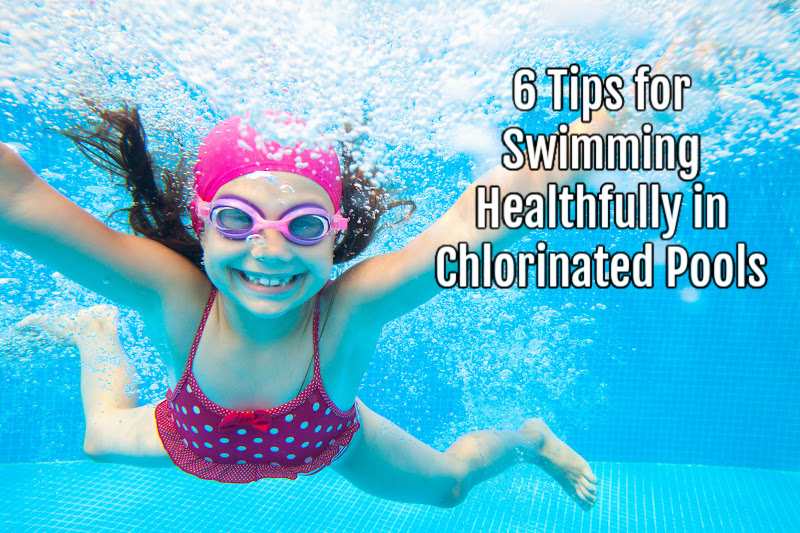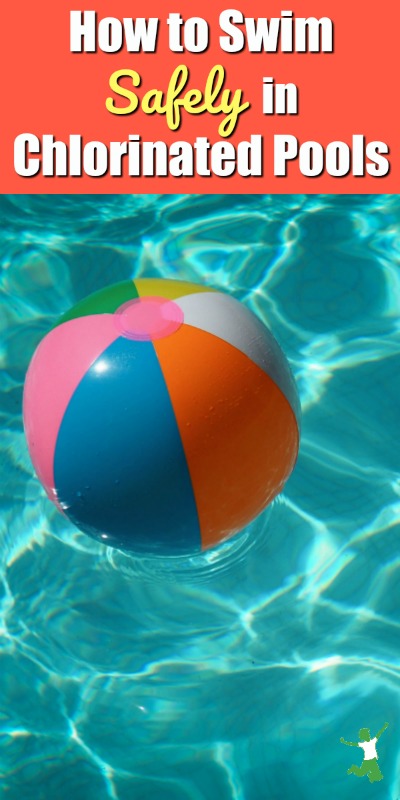The reasons why swimming in chlorinated pools is dangerous to health and the 6 steps to take to protect yourself and your family while still enjoying water fun all summer long.

The reasons why swimming in chlorinated pools is dangerous to health and the 6 steps to take to protect yourself and your family while still enjoying water fun all summer long.
An important topic to explore as we head into the summer season is chlorinated pools.
Chlorine is popular because it handles the three main jobs in keeping a swimming pool clean: It sanitizes (kills bacteria and germs), oxidizes (controls organic debris from perspiration and body oils), and deters algae. The chemical is unpopular, however, because it has a strong odor, reddens eyes, causes allergic reactions in some swimmers, and is a known carcinogen – meaning it has been linked to cancer!
Chlorine absorbs into your skin. Too much exposure to chlorine has been linked to major health problems including reproductive disorders and even birth defects. It can cause your skin and hair to dry out and over time too much exposure can even cause wrinkles.
Editor’s Note: Have you ever wondered why Olympic swimmers seem to have so many wrinkles at such young ages and most of the men start losing their hair so quickly? Could it, in fact, be caused by overexposure to chlorine for so many years and so many hours every day? Perhaps so.
When chlorinated pools are indoors, toxic gases such as nitrogen trichloride are released, which can be very dangerous. When we breathe in this gas it can cause severe damage to the lining of the lungs which could lead to respiratory problems or asthma. This toxic gas can be harmful at any age yet it poses the most risk to elderly people and small children.
So while chlorine used to disinfect swimming pools is widely recognized as a health hazard, not everyone has access to the ocean or a lake, or pools treated with ozone, ionizers, bromine, silver-cooper, or other alternatives which can frequently be much more expensive.
6 Tips to Protect Health in Swimming Pools
If you or your family members do choose to swim in chlorinated pools, some recommendations I’ve read are to:
1. Swim in outdoor chlorinated pools only if at all possible. It is much safer because the toxic gases are mostly eliminated in the open air.
2. Swim in chlorinated pools occasionally. It is regular exposure to chlorinated pools that presents the greatest risk to health.
3. Shower immediately before and after using a natural Castile soap.
4. Drink plenty of home-filtered water (better than bottled!) beforehand so that you are well hydrated.
5. Consider wearing a mask and snorkel to shield your eyes – and even a wetsuit, if you are willing to go that far!
6. Get fresh air afterward so you don’t continue to inhale the fumes, and can clear your lungs.
Why shower immediately before swimming in a chlorinated pool?
Julie Deardorff explains in her article published in the Chicago Tribute, “Another important reason to shower is that our bodies generally contain residue from consumer products, including perfume, make-up, body lotion, shampoo, and sunscreen.
When the chemicals used to disinfect the pool mix with organic matter (sweat, hair, urine) or nitrogen-rich substances (commonly found in consumer products) it can create a more toxic agent, said Michael Plewa, a professor of genetics at the University of Illinois whose new research has linked pool chemicals to health problems, including asthma and bladder cancer.”
Red, burning, itchy eyes and skin?
What I’ve read is that the presence of chloramines can cause reactions such as red, burning, irritated eyes: Chloramines form when chlorine reacts with ammonia. Ammonia enters the pool through sweat and urine. It is important to teach children not to urinate in pool water [even though it is chlorinated].
Also, showering before swimming can remove excess sweat that interacts with chlorine. My understanding is that if the sweat is on your skin, and hasn’t been rinsed off first in the shower, the chlorine will interact with the sweat on your skin as you enter the pool, and may result in some folks getting itchy skin.
So, what do you think? Do the benefits and joy of swimming and playing in a pool outweigh the health risks of chlorine?

Additional articles on this topic
The Dangers of Chlorine
Asthma In Swimmers
Swimming Pools May Increase Cancer Risk
The Hidden Danger of Swimming Pools
Swimming Pool Alternatives to Chlorine
Water Birth Dangers








Good article, I have been taking my 6 month old baby swimming in a children’s pool but it has been causing really dry skin. It was supposed to be chlorine free yet you can smell chlorine on him.
Ozonator is sounds good suggestion by Raghu. I have read an article similar to this matter a combination of salt and chlorine could also reduce the irritation in the eyes cause by chlorine.
Hi Ken,
One point to note is that ozone pools are not chlorine free. Chlorine is still required for residual sanitation. Same with UV. You might want to check out my site at clearcomfort.com if you want to learn about a truly chlorine-free option.
What do you mean by UV is used? This can surely have no negative health effect?
I would actually suggest an ozonator(ozone generator) because it would totally eliminate the use of any of the above mentioned chemicals and also provide a much better experience. Earlier, there were very few manufacturers of such products and the reliability was an issue but off late there are some good products with greater reliability. To know more about ozonators and the way they function kindly visit our website http://www.technozone.in or click on the link
I have found the best solution from a fabulouscompany called enviroswim in Australia. I have had the pool for a year now and can honestly say buy one and save money aswell as eliminate the dangers of chemicals. All you need to do is top up the Acid and every two years spend $70 on a new set of diodes. It is like swimming in a stream or lake. Chlorine is so 30 years ago and it is time we all woke up to the fact that pool shops would no longer be required. Unfortunately chemical companies manage to offer large incentives probabl as far as local governments to keep the chlorine pouring in. It’s time everybody said no to this filthy killer chemical.
Would love to go to the pool with you guys and see the looks you get from others when you perform these rituals before swimming.
Also, take iodine! Chlorine (and fluoride and bromide) displaces iodine in the thyroid and tissues like breast and ovaries. Taking extra iodine will push these out and help detox them.
Two drops of 5% Lugol’s solution per day.
What about brominated pools?
In Europe I understand that natural swimming pools are popular. I hope to have one someday. Plants clean the water. http://www.motherearthnews.com/diy/natural-swimming-pool-zmaz02aszgoe.aspx#axzz334l7o7GX
What about not putting your kids future health at risk? Why is this not obvious!
For all the lucky folks who swam in chlorine (a carcinogen) as kids and now say they have perfect, vibrant health – hooray for you! But, the majority of the population are sick adults – look around, perhaps all those years of swimming in poison DID have an affect. xoxo
My son always felt sick after swimming in chlorine, until we learned he should shower beforehand. Besides clearing away sweat, I think it also saturates the skin with less-chlorinated water, so he doesn’t absorb as much in the pool.